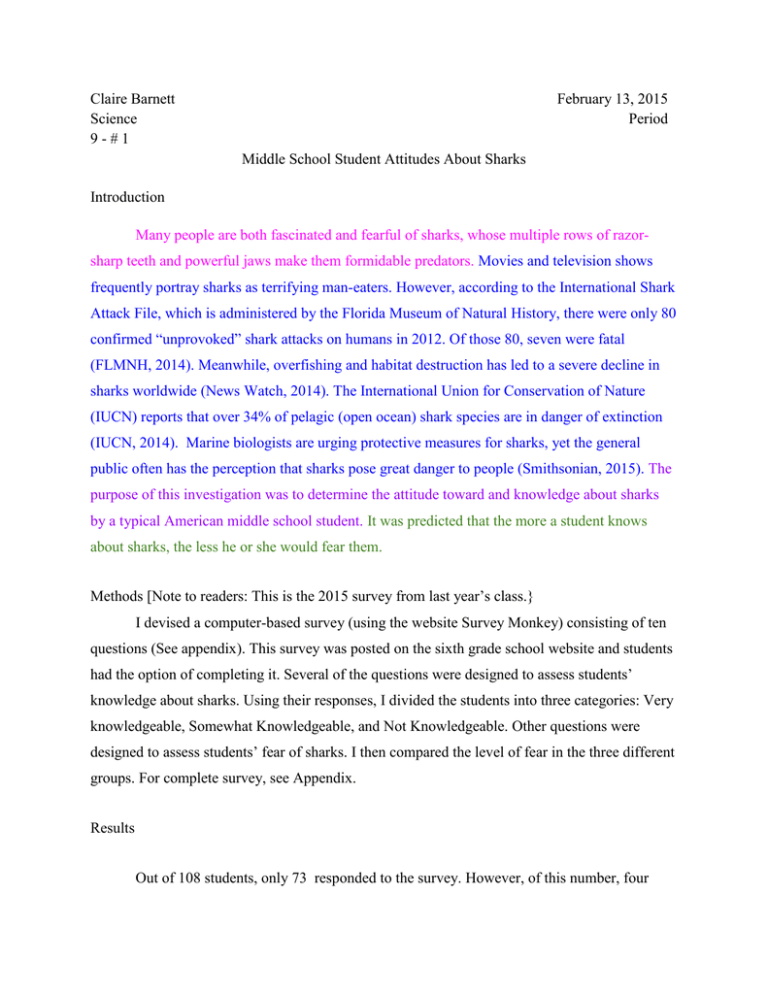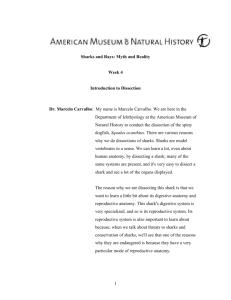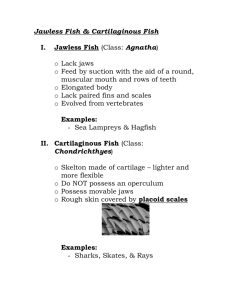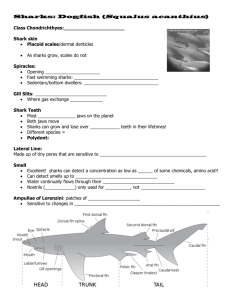Middle School Student Attitudes About Sharks
advertisement

Claire Barnett Science 9-#1 February 13, 2015 Period Middle School Student Attitudes About Sharks Introduction Many people are both fascinated and fearful of sharks, whose multiple rows of razorsharp teeth and powerful jaws make them formidable predators. Movies and television shows frequently portray sharks as terrifying man-eaters. However, according to the International Shark Attack File, which is administered by the Florida Museum of Natural History, there were only 80 confirmed “unprovoked” shark attacks on humans in 2012. Of those 80, seven were fatal (FLMNH, 2014). Meanwhile, overfishing and habitat destruction has led to a severe decline in sharks worldwide (News Watch, 2014). The International Union for Conservation of Nature (IUCN) reports that over 34% of pelagic (open ocean) shark species are in danger of extinction (IUCN, 2014). Marine biologists are urging protective measures for sharks, yet the general public often has the perception that sharks pose great danger to people (Smithsonian, 2015). The purpose of this investigation was to determine the attitude toward and knowledge about sharks by a typical American middle school student. It was predicted that the more a student knows about sharks, the less he or she would fear them. Methods [Note to readers: This is the 2015 survey from last year’s class.} I devised a computer-based survey (using the website Survey Monkey) consisting of ten questions (See appendix). This survey was posted on the sixth grade school website and students had the option of completing it. Several of the questions were designed to assess students’ knowledge about sharks. Using their responses, I divided the students into three categories: Very knowledgeable, Somewhat Knowledgeable, and Not Knowledgeable. Other questions were designed to assess students’ fear of sharks. I then compared the level of fear in the three different groups. For complete survey, see Appendix. Results Out of 108 students, only 73 responded to the survey. However, of this number, four respondents did not answer all ten questions. Because of this, their data could not be used in the study, leaving only 69 useable responses.. First the respondents were divided into categories determined by how accurately they answered Questions 4 through 8. Students who answered four or five questions correctly were designated “Extremely Knowledgeable.” A score of two or three correct rendered a student “Somewhat Knowledgeable,” while a score of one or two resulted in the designation “Not At All Knowledgeable.” After dividing the students into these three categories, their responses to the last two questions were recorded in Table 1, below. Table 1: Students Responses to Questions #9 and #10, broken down by “Knowledge” category. Survey Question Category #9. Are you afraid of sharks? #10. If you were on the beach and a shark had been sighted in the water that same day, would you go in swimming? Total number of Students YES NO YES NO Extremely Knowledgeable 11 4 7 3 8 Somewhat Knowledgeable 37 17 20 4 33 Not at all Knowledgeable 21 15 6 0 21 Since the total number of students in each category were not equal, percentages were calculated in order to compare them fairly. As shown in the graph below, the students in the “Extremely Knowledgeable” category were the most likely (64%) to report that they did not fear sharks. This category also had the highest percentage (36%) of students who claimed they would swim in water where a shark had been sighted. The intermediate category, “Somewhat Knowledgeable,” shows a slightly lower percentage (54%) of students who claimed they were not afraid of sharks and a much lower percentage (11%) of students who said they would swim in water if a shark had been seen there. In the “Least Knowledgeable” category, a minority of students (29%) said they were not afraid of sharks and no students at all responded that they would swim in water in which a shark had been sighted recently. Discussion Only about 64% of the sixth grade population at Brookside School participated in the survey. This amount should be a sufficient percentage to provide a fairly accurate picture of the class’s general feelings about sharks, but this might not actually be the case. Since the survey was voluntary, students who had stronger feelings about sharks, either positive or negative, might have been more likely to complete the survey. Despite this possible bias, the data suggests that, as predicted, there is a strong correlation between lack of knowledge about sharks and fear of them. 64% of the students who answered four or five of the questions about sharks correctly said they were not afraid of sharks. As knowledge decreased, so did the percentage of students who said they were not afraid. Perhaps the responses to the final question are even more indicative of a person’s attitude about sharks. Since “actions speak louder than words,” the final question was intended to gauge the respondents’ reaction during a real-life situation. One could argue that a person could be fearless yet cautious, or that it is easy to say you would do something when the situation is merely hypothetical, so these results should be interpreted with caution. Even so, there is a direct relationship between knowledge category and the answer to the last question. 100% of the “Not at all Knowledgeable” students said they would not enter water where a shark had been sighted that same day. Slightly more than 10% of the students in the “Somewhat Knowledgeable” category said they would do so, while more than a third of the students in the “Extremely Knowledgeable” category claim they would enter such waters. These inferences are based on the assumption that respondents answered the questions honestly, but there is the possibility that some students did not take the survey seriously. There could also be a flaw in the assumption that the beliefs of this particular group of sixth graders represents the feelings of middle schoolers in general. It would be interesting to compare the attitudes of Brookside 6th graders to that of other groups of students. One such comparison could be between students at a suburban school like Brookside and an urban school. Another idea would be to compare responses from students who live near the ocean to those that live far from it. Conclusion Although there are areas of uncertainty and the sample size is relatively small, the results of this investigation support the prediction that students who are more knowledgeable about sharks are less likely to fear them. In addition, it can be concluded that Brookside 6th graders know very little about sharks. For example, 39% of the respondents incorrectly identified sharks as mammals, and 79% believed that all sharks have rows of sharp teeth that are replaced throughout their lives. In fact, carnivorous sharks possess very sharp teeth, but plankton-feeding sharks, such as whale sharks and basking sharks, have tiny, useless teeth. Bottom feeders, like the Port Jackson Shark, have flat teeth for crushing crustaceans (National Aquarium, 2015). As people learn more facts such as these about sharks, it is likely that their fears will decrease, as was suggested by the results of this investigation. References “5 Reasons to Revere, Not Fear, the Shark.” Ocean Portal: Find Your Blue. Smithsonian Museum of Natural History, n.d. Web. 09 Feb. 2015. "FLMNH Ichthyology Department: International Shark Attack File." FLMNH Ichthyology Department: International Shark Attack File. N.p., n.d. Web. 28 Jan. 2014. "IUCN, the International Union for Conservation of Nature." IUCN. N.p., n.d. Web. 28 Jan. 2014. "New Study: 1 in 4 Sharks and Rays Threatened With Extinction." News Watch. N.p., n.d. Web. 28 Jan. 2014. Appendix The survey consisted of the following questions: 1. What homeroom are you in? 2. Have you ever seen a shark in the ocean (not an aquarium)? 3. How would you rate your knowledge of sharks? 4. How many species of sharks are there in the world? [Answer: >400] 5. What is the world’s largest living shark? [Whale Shark] 6. Which species of shark is most likely to attack humans? [1 - Great White, 2 - Tiger, 3 - Bull] 7. True or False: Sharks are mammals. [False] 8. True or False: All sharks have rows and rows of sharp teeth. [False] 9. Are you afraid of sharks? 10. If you were on the beach and a shark had been sighted in the water that same day, would you go in swimming?






